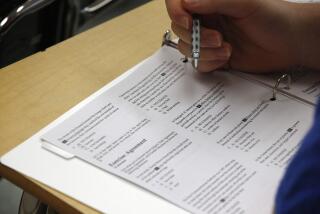SAT overhaul to make essay optional, end penalty for wrong answers
In a major overhaul of the SAT college entrance exam, students starting in 2016 will no longer be required to write an essay, will not be penalized for wrong answers and will not be able to freely use calculators.
The College Board announcement Wednesday shook up a test that is taken by about 1.7 million high school students annually and, though its influence has been waning, remains a major factor in college admission decisions nationally.
The shifts, officials said, are part of an effort to better align the 88-year-old exam with what students learn in high school and to get away from any advantages they may gain from expensive private tutoring.
The main SAT will be condensed to two sections from the current three, and the top score possible will be 1,600 — as it had been for many decades. (The present 2,400 point maximum began with the introduction of the essay seven years ago.) The writing portion will be optional — though many colleges still may demand applicants take it — and will be graded separately.
College Board President David Coleman said the revised reading exam will drop the most obscure vocabulary words and instead “focus on words students will use over and over again.” The math problems will be less theoretical and more linked to real-life questions.
“While we build on the best of the past, we commit today that the redesigned SAT will be more focused and useful, more clear and open, than ever before,” Coleman said in a speech in Austin, Texas, that was streamed on the Internet.
Under the new testing structure, calculators will be banned on some sections of the math exam and students will no longer have a quarter of a point deducted from their final score for each wrong answer. In addition, the College Board, which owns the SAT, said it would start offering the exam online as well as in the traditional paper version.
Although test sponsors long have argued that coaching does not help students significantly raise their scores, Coleman acknowledged Wednesday that many people believe tutoring does lend an advantage, worsening the sense of “inequality and injustice” surrounding the SAT.
“It is time for an admissions assessment that makes it clear that the road to success is not last-minute tricks or cramming, but the challenging learning students do each day,” Coleman said.
To help address that issue, the College Board is starting a partnership with the online Khan Academy to offer a free series of practice exams and videos about good test-taking methods. The Silicon Valley-based academy has become one of the most popular online education sites, particularly its math offerings.
By all appearances, the new SAT will be more populist and more in line with the new federal Common Core teaching standards for K-12 education adopted by most states. Math questions, for instance, will concentrate more on basic areas of problem solving, data analysis and algebra.
Reaction to Wednesday’s announcement included complaints that the SAT was being dumbed down and statements of strong support. Education analysts said the College Board was taking the steps out of both self-interest and public interest.
The SAT in recent years has been losing market share to the ACT exam, which most colleges also accept. Last year, about 1.8 million students took the ACT compared with about 1.7 million for the SAT, while some took both as insurance. In some ways, the new SAT will become more like the ACT, which has an optional writing section and does not penalize students for wrong answers.
Critics have said that the SAT is unfair to low-income and minority students, and is a less reliable predictor of college success than are high school grades. As a result, some colleges have eliminated the need for any entrance exam.
Dropping the essay requirement poses a dilemma for many colleges, especially the University of California system — the largest customer of the SAT. UC administrators pushed for and won a previous set of SAT reforms that included the addition of the 25-minute-long handwritten essay.
Stephen Handel, the UC system’s associate vice president for undergraduate admissions, said it was too soon to say whether UC would continue to require the essay. Such a decision will be made by a special faculty committee that handles admissions standards and by the UC regents.
But Handel and other administrators noted that the UC application requires its own essays and that the SAT writing sample is just one part of a wide portfolio of grades and personal achievements. The SAT essay, he said, “has a place, but a limited place.”
Coleman said Wednesday that college admissions officers were divided over the value of the essay in choosing a freshman class. “One essay alone historically has not contributed significantly to the overall predictive power of the exam,” he said.
The optional essay will be more closely linked to the texts presented to students during the exam, requiring more analysis and citations from the material in the questions and less riffing on personal opinions and possibly untruthful narratives, officials said.
However, some critics said making the essay optional and having a main test of only multiple-choice questions sends a bad and perplexing message.
“I’m not sure it is a good signal to kids in schools about the importance of writing,” said Katy Murphy, president of the National Assn. for College Admission Counseling. The change also will confuse high school seniors, who may not have access to good counseling and may be unsure of how to fulfill requirements that vary among colleges, said Murphy, director of college counseling at Bellarmine College Preparatory high school in San Jose.
On the other hand, Paul Jordan, director of student counseling at Loyola High School, a Jesuit boys school in Los Angeles, welcomed the changes as a stress reliever for students. He also said he favored the essay becoming optional, since the way a student interprets the essay question “can affect their scores and can be problematic.”
A persistent and vocal critic of the SAT remained unswayed.
Bob Schaeffer, public education director of the National Center for Fair & Open Testing, predicted that the revised test was unlikely to be better than the current one and that commercial coaching still would be popular.
“The partnership with the Khan Academy is unlikely to make a dent in the huge market for high-priced, personalized SAT workshops and tutoring that only well-to-do families can afford,” he said in a statement.
Times staff writer Alicia Banks contributed to this article.
More to Read
Start your day right
Sign up for Essential California for news, features and recommendations from the L.A. Times and beyond in your inbox six days a week.
You may occasionally receive promotional content from the Los Angeles Times.







